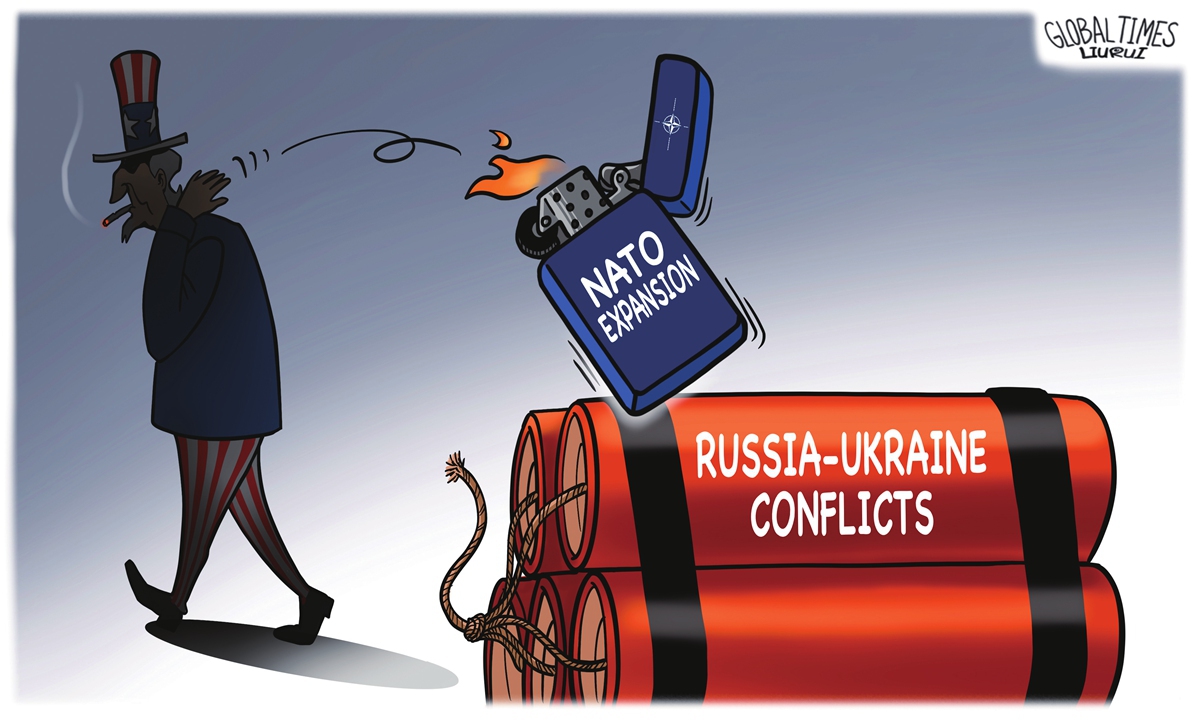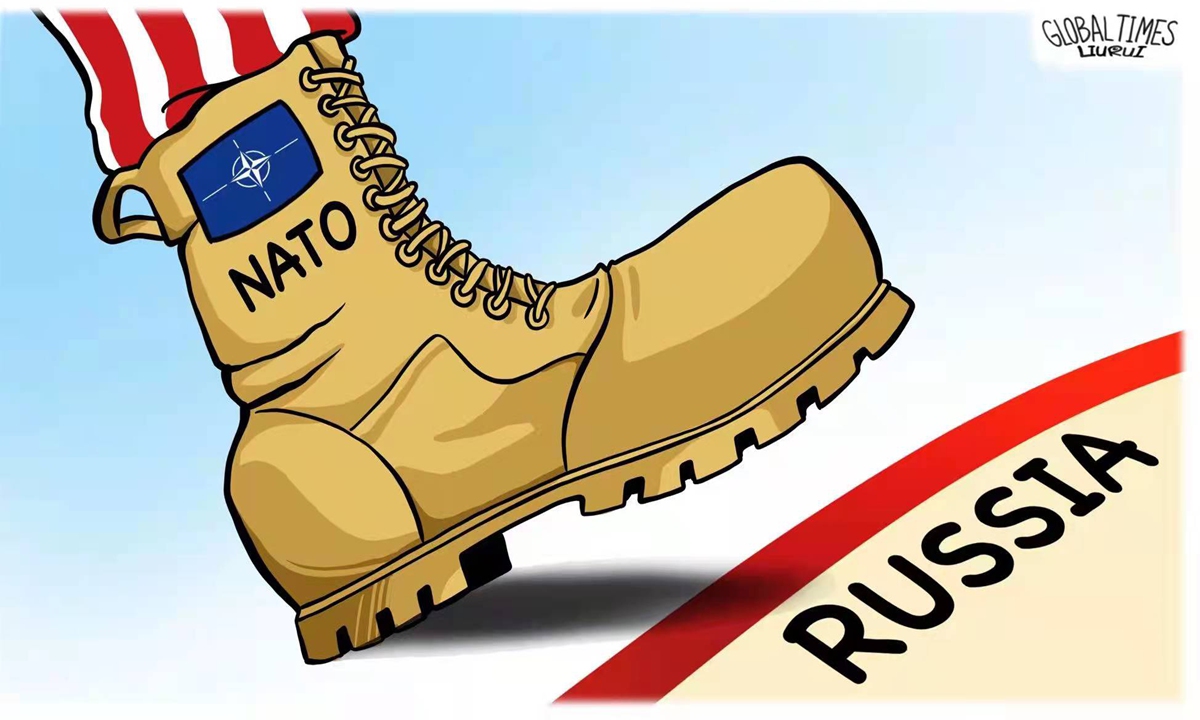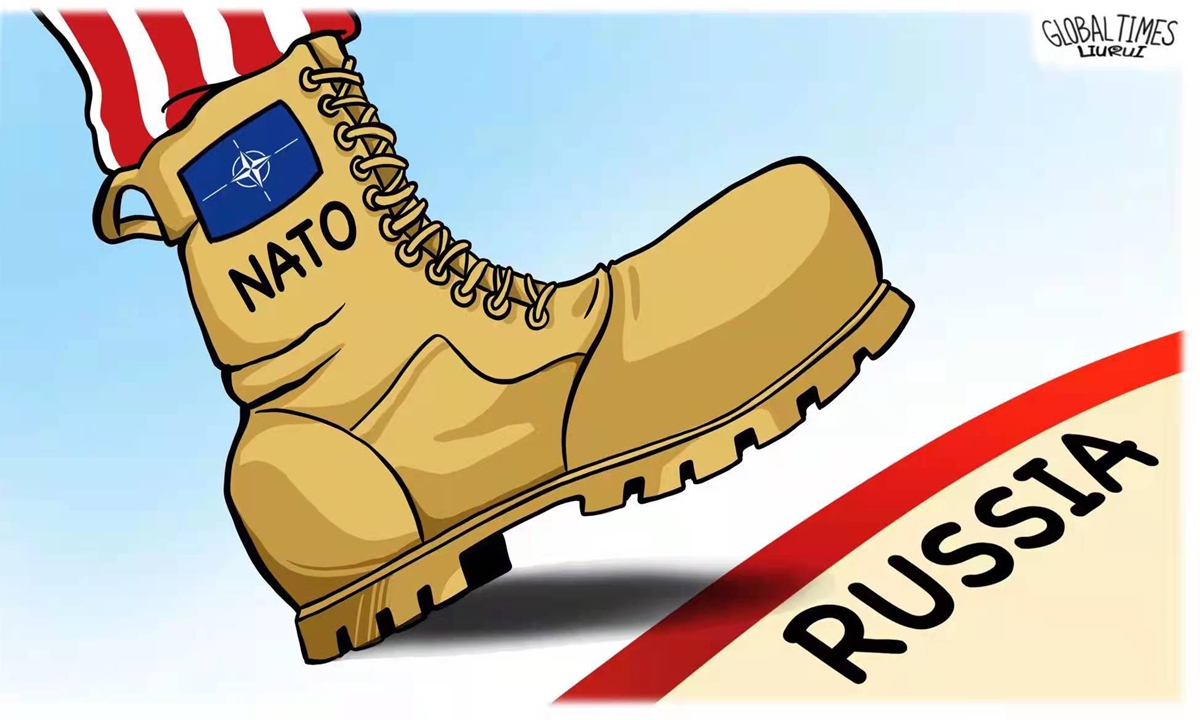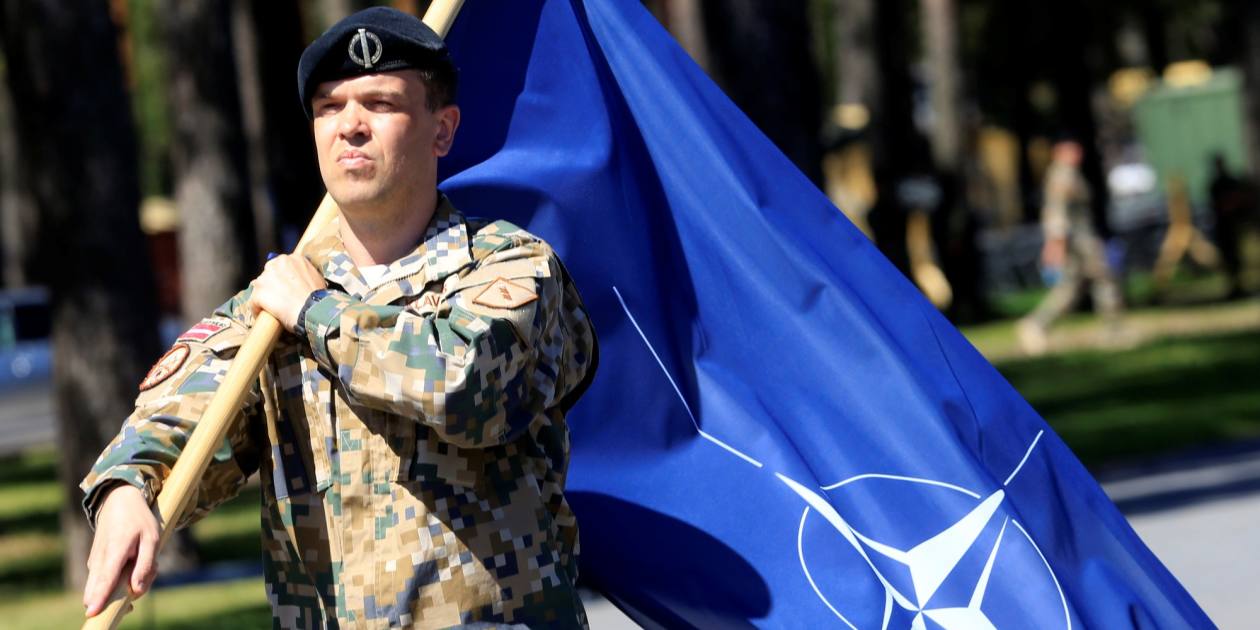beijingwalker
ELITE MEMBER

- Joined
- Nov 4, 2011
- Messages
- 65,191
- Reaction score
- -55
- Country
- Location
73rd anniv of NATO foundation a reminder of US long-term control of Europe’s security
Global Times
By Chen Qingqing and Xu Yelu
Published: Apr 05, 2022 07:38 PM
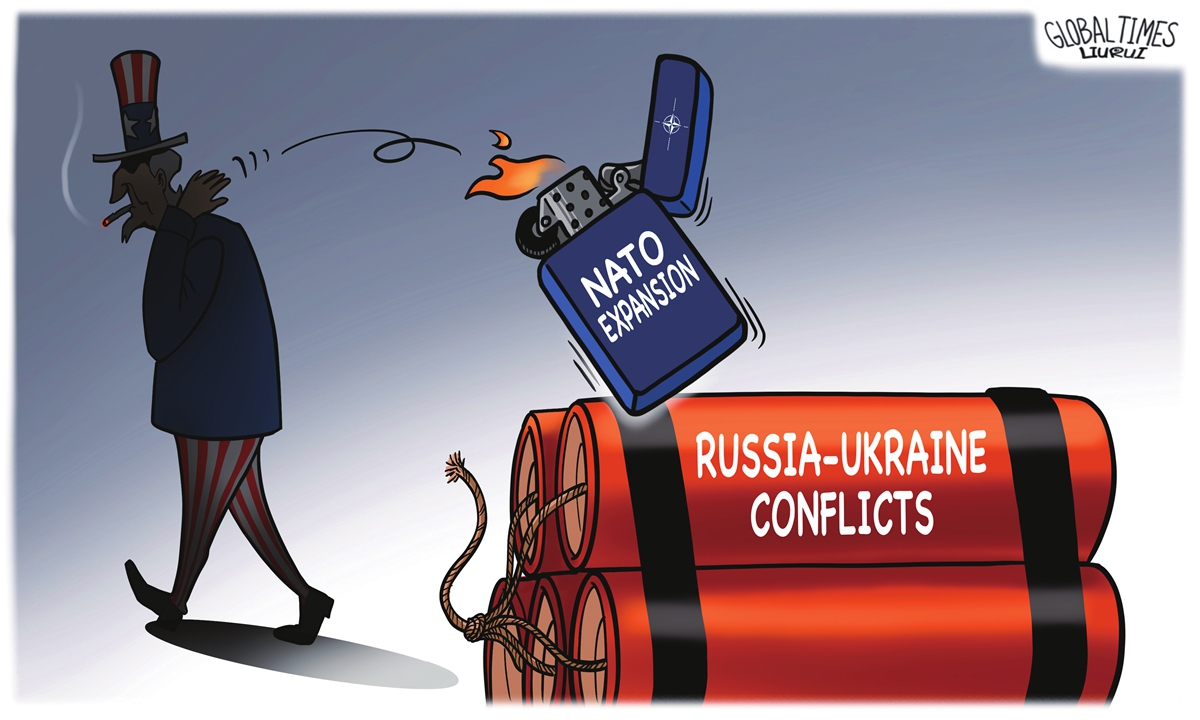
NATO Expansion Illustration: Liu Rui/GT
As the North Atlantic Treaty Organization (NATO) celebrates the 73rd anniversary of its 1949 establishment, a new poll conducted by the All-Russian Public Opinion Research Center (VTsIOM) showed that the majority of Russian people hold a negative attitude toward the bloc that is widely considered as the product of the Cold War. As the real initiator and driving force behind the ongoing Russia-Ukraine conflict, the NATO is destroying Europe, some Russian media said, while Chinese experts noted that the only way for Europe to reach its goal of having strategic autonomy is to shake off the long-term US control in terms of security.
The bloc said on its website on Monday (local time) that April 4 marks the 73rd anniversary of NATO, and since its foundation, it has guaranteed the security and safety of allied citizens in Europe and North America. And to mark the anniversary, capitals across the alliance illuminated buildings in NATO blue and raised the NATO flags.
However, about 60 percent of Russians hold a negative view toward the military-political bloc, and Russian citizens predominantly believe that NATO is a military structure aimed at taking aggressive actions against Russia and its allies, and most Russians are aware of its military operations in Yugoslavia, Libya, Iraq and Afghanistan, as the VTsIOM poll showed on Monday.
The evolution of the NATO over the past 73 years is the history of how the US manipulated and controlled Europe to maintain its hegemony in the continent. From confronting the former Soviet Union ruthlessly to strategically expelling Russia today, NATO helped shape the current security framework in Europe, led by the US, causing division and confrontation in Europe, Li Haidong, a professor from the Institute of International Relations at the China Foreign Affairs University in Beijing, told the Global Times on Tuesday.
"It's the main product underscoring the US interests, and the Ukraine crisis shows that it's highly difficult for Europe to strike a balance between NATO and Russia," Li said.
For Europeans, the anniversary of the bloc's founding is rather a shame and even a threat, Russian online newspaper Vzglyad said in an article on Monday. Seventy-three years ago, the entry of European countries into NATO looked logical, as Western Europe considered itself extremely vulnerable to the former Soviet Union and to the potential restoration of German power, but now the need for military protection has greatly subsided, as the basic goals of NATO is to keep the US inside, the Russian media said.
Although there has been a divided attitude inside Europe toward NATO, there have been aggressive expansions of NATO in the past decades that caused concrete security threats to Russia and other non-NATO countries in the region.
Former German chancellor Angela Merkel on Monday defended her 2008 decision to block Ukraine from immediately joining NATO, rejecting Ukrainian President Volodymyr Zelensky's criticism, the AFP reported.
The Ukrainian president also accused the European leaders of seeking to appease Russia with their stance at that time, the AFP said, but Merkel in a short statement issued by her spokeswoman said she "stands by her decisions in relation to the 2008 NATO summit in Bucharest."
Since the disintegration of the Soviet Union, NATO has lost its traditional enemy and has been seeking a transformation from a purely military bloc to a politically secure one, Wang Yiwei, director of the Institute of International Affairs at the Renmin University of China, told the Global Times on Tuesday.
The military is purely about fighting wars, but in areas like security and non-traditional security, there is also a crucial political function, and the political function is to maintain the transatlantic political ties, like the G7, to defend Western values, he said.
"In the name of making Europe more secure, NATO's 73-year history actually has been dominated by the US, and NATO's presence has largely undermined Europe's ability to equip itself militarily," Wang said.
While Europe keeps calling for strategic autonomy, as long as the NATO stands there, the "brains and muscles" of the military and political bloc are in the hands of the Americans, as their weapons are also from the US, experts said. They noted that the Russia-Ukraine conflict is actually a trap the US has set for Europe: the US military-industrial complex promotes NATO's eastward expansion to make money, then hijacks European security, and creates the Russia-Ukraine conflict to undermine Russia.
As a latest example, the US State Department has approved the potential sales of up to eight F-16 aircraft and related equipment to Bulgaria, in a deal valued at $1.673 billion, Reuters reported on Monday, citing the US Defense Department.
In Russia, an exhibition entitled NATO: Chronicle of Cruelty coincided with the NATO's 73rd anniversary, which will last for three weeks, and the First Deputy Chairman of the State Duma Committee on Labor, Social Policy and Veterans Affairs Elena Tsunaeva said it is necessary to translate it into several languages to make it accessible to foreign audiences. And it would be possible to send this exhibition to countries like Serbia to make local people remember NATO's attacks on their country, Russian media Vzglyad said.
In the wake of the Russia-Ukraine conflict, Europe's status will further decline, which is a dilemma for itself. If there is no relatively powerful country to break the US' monopoly, Europe will gradually break apart and further divide, Wang noted.
"For Europe, the balance must be achieved by placing Europe's strategic autonomy and security in the hands of the Europeans themselves, free of American control," he said.
Global Times
By Chen Qingqing and Xu Yelu
Published: Apr 05, 2022 07:38 PM

NATO Expansion Illustration: Liu Rui/GT
As the North Atlantic Treaty Organization (NATO) celebrates the 73rd anniversary of its 1949 establishment, a new poll conducted by the All-Russian Public Opinion Research Center (VTsIOM) showed that the majority of Russian people hold a negative attitude toward the bloc that is widely considered as the product of the Cold War. As the real initiator and driving force behind the ongoing Russia-Ukraine conflict, the NATO is destroying Europe, some Russian media said, while Chinese experts noted that the only way for Europe to reach its goal of having strategic autonomy is to shake off the long-term US control in terms of security.
The bloc said on its website on Monday (local time) that April 4 marks the 73rd anniversary of NATO, and since its foundation, it has guaranteed the security and safety of allied citizens in Europe and North America. And to mark the anniversary, capitals across the alliance illuminated buildings in NATO blue and raised the NATO flags.
However, about 60 percent of Russians hold a negative view toward the military-political bloc, and Russian citizens predominantly believe that NATO is a military structure aimed at taking aggressive actions against Russia and its allies, and most Russians are aware of its military operations in Yugoslavia, Libya, Iraq and Afghanistan, as the VTsIOM poll showed on Monday.
The evolution of the NATO over the past 73 years is the history of how the US manipulated and controlled Europe to maintain its hegemony in the continent. From confronting the former Soviet Union ruthlessly to strategically expelling Russia today, NATO helped shape the current security framework in Europe, led by the US, causing division and confrontation in Europe, Li Haidong, a professor from the Institute of International Relations at the China Foreign Affairs University in Beijing, told the Global Times on Tuesday.
"It's the main product underscoring the US interests, and the Ukraine crisis shows that it's highly difficult for Europe to strike a balance between NATO and Russia," Li said.
For Europeans, the anniversary of the bloc's founding is rather a shame and even a threat, Russian online newspaper Vzglyad said in an article on Monday. Seventy-three years ago, the entry of European countries into NATO looked logical, as Western Europe considered itself extremely vulnerable to the former Soviet Union and to the potential restoration of German power, but now the need for military protection has greatly subsided, as the basic goals of NATO is to keep the US inside, the Russian media said.
Although there has been a divided attitude inside Europe toward NATO, there have been aggressive expansions of NATO in the past decades that caused concrete security threats to Russia and other non-NATO countries in the region.
Former German chancellor Angela Merkel on Monday defended her 2008 decision to block Ukraine from immediately joining NATO, rejecting Ukrainian President Volodymyr Zelensky's criticism, the AFP reported.
The Ukrainian president also accused the European leaders of seeking to appease Russia with their stance at that time, the AFP said, but Merkel in a short statement issued by her spokeswoman said she "stands by her decisions in relation to the 2008 NATO summit in Bucharest."
Since the disintegration of the Soviet Union, NATO has lost its traditional enemy and has been seeking a transformation from a purely military bloc to a politically secure one, Wang Yiwei, director of the Institute of International Affairs at the Renmin University of China, told the Global Times on Tuesday.
The military is purely about fighting wars, but in areas like security and non-traditional security, there is also a crucial political function, and the political function is to maintain the transatlantic political ties, like the G7, to defend Western values, he said.
"In the name of making Europe more secure, NATO's 73-year history actually has been dominated by the US, and NATO's presence has largely undermined Europe's ability to equip itself militarily," Wang said.
While Europe keeps calling for strategic autonomy, as long as the NATO stands there, the "brains and muscles" of the military and political bloc are in the hands of the Americans, as their weapons are also from the US, experts said. They noted that the Russia-Ukraine conflict is actually a trap the US has set for Europe: the US military-industrial complex promotes NATO's eastward expansion to make money, then hijacks European security, and creates the Russia-Ukraine conflict to undermine Russia.
As a latest example, the US State Department has approved the potential sales of up to eight F-16 aircraft and related equipment to Bulgaria, in a deal valued at $1.673 billion, Reuters reported on Monday, citing the US Defense Department.
In Russia, an exhibition entitled NATO: Chronicle of Cruelty coincided with the NATO's 73rd anniversary, which will last for three weeks, and the First Deputy Chairman of the State Duma Committee on Labor, Social Policy and Veterans Affairs Elena Tsunaeva said it is necessary to translate it into several languages to make it accessible to foreign audiences. And it would be possible to send this exhibition to countries like Serbia to make local people remember NATO's attacks on their country, Russian media Vzglyad said.
In the wake of the Russia-Ukraine conflict, Europe's status will further decline, which is a dilemma for itself. If there is no relatively powerful country to break the US' monopoly, Europe will gradually break apart and further divide, Wang noted.
"For Europe, the balance must be achieved by placing Europe's strategic autonomy and security in the hands of the Europeans themselves, free of American control," he said.

